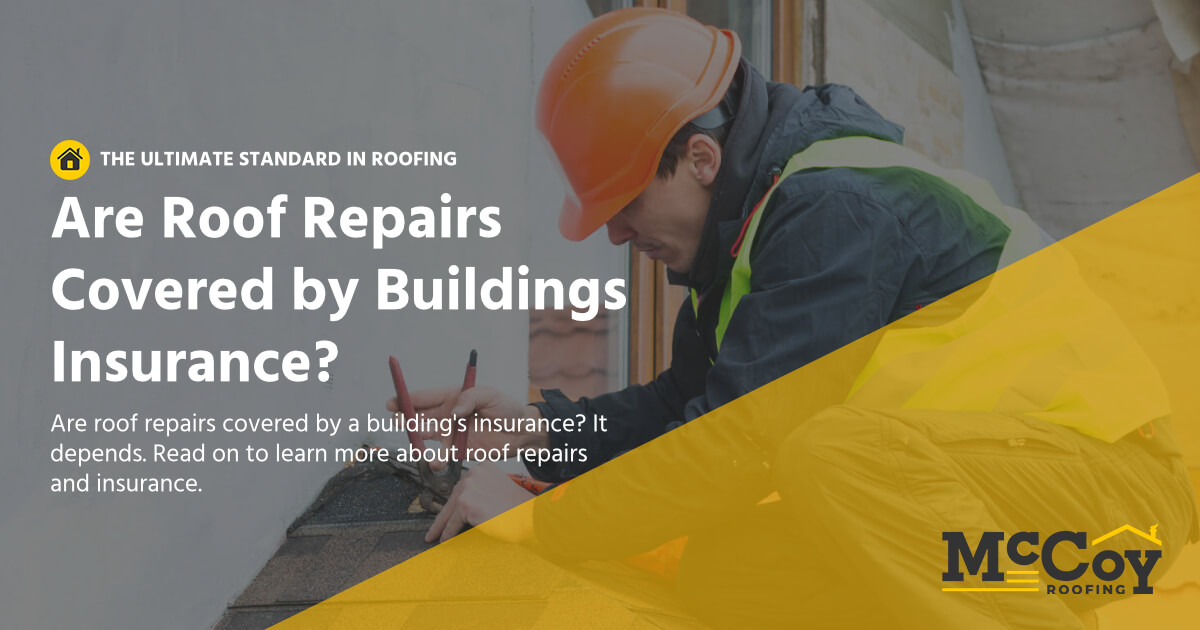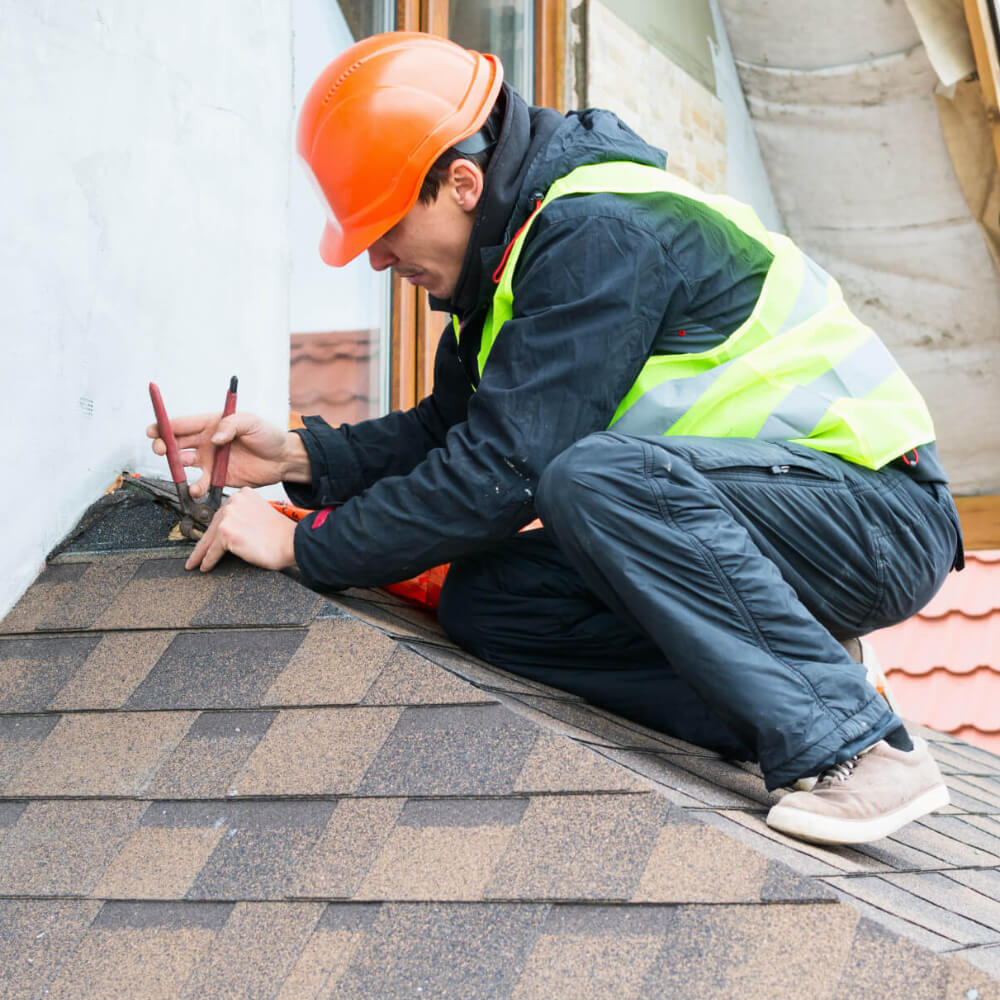

Are Roof Repairs Covered by Buildings Insurance?
Are roof repairs covered by a building’s insurance? It depends. Read on to learn more about roof repairs and insurance.

The telltale signs of a leaky roof may have you wondering, “Are roof repairs covered by buildings insurance?” Understanding homeowners insurance can be a tricky proposition, so we’ll break down what you can expect to pay for in the event of roof damage.
We’ll even answer this common question, “Can a roofing company pay my deductible?”
Are Roof Repairs Covered by a Buildings Insurance?
Most homeowners’ insurance policies pay for roof leaks. Individual policies will describe which causes of roof leaks are covered and which are not. Most policies cover roof leaks that result from a storm or hail.
In cases where a leak results from homeowner neglect, the homeowner may have to foot the bill. Reporting roof damage quickly is one way to ensure that your insurance covers most of the cost of roof repairs.
Even if your homeowner insurance policy covers your repair costs, you’ll still be responsible for paying the deductible. We’ll cover that process next.
How Homeowners Insurance Works
All forms of insurance are intended to protect policyholders from excessive expenses following an unforeseen event. Roof insurance is particularly valuable because the cost of repairing and replacing a roof can range from a few thousand dollars to several thousand or more. Commercial roof repairs and replacement can easily cost tens of thousands of dollars.
As one might expect, roof insurance is intended to shield homeowners from much of the financial burden of repairing or replacing a roof. Roof insurance is typically included as part of homeowners insurance.
Types of Damage Covered by Roof Insurance
Roof insurance typically covers home damage that results from:
- Fire
- Smoke
- Vandalism
- Wind
- Hail damage
- Falling debris
- Other weather-related forms of damage
Of course, these are general examples. Refer to your homeowners’ insurance policy for specific protections.
Understand Your Homeowners Insurance
If you are a new homeowner, be sure to carefully discuss what is and isn’t covered in your homeowner policy. Spending a few extra bucks on your policy could save you thousands of dollars in the event of an unforeseen accident.
The Claim Process
Once your home has damage, you’ll need to file a claim. Typically, an inspector visits your home and assesses the damage.
Then, the inspector reports back to your insurance company and describes the extent of the damage. Your insurance company will come up with a proposal that includes estimates for the repair and a reminder of your deductible amounts.
Insurance Deductibles
Deductibles are set fees that insurance companies charge before covering the cost of a roof repair. If you accept the proposal, you’ll pay the deductible, and your insurance company will either cut your check or pay a roofing company directly to perform the repairs. Some roofing companies will offer to pay your deductible, although that’s not standard practice.
Roof Depreciation
The amount that your insurance company pays out depends, in part, on the age of your roof. A leaky new roof will net you the highest cash payout while a 10-year-old roof will be covered at a reduced rate. Like cars, roofs depreciate over time.
If your roof is 20 years old or older, your insurance policy may decline to cover the cost of repairs. A roof at that age is prone to leaks and probably needs replacing. One way to prolong the life of your roof is to replace asphalt shingles with a metal roof.
Repairs Vs Replacement
Deciding whether to replace or repair a roof requires consideration of several factors. Isolated and minor damage (especially of a new roof) almost always can be handled with roof repairs.
If the repair estimates are near the cost of replacing your roof, consider replacing it. You’ll have a new roof and fewer worries about wear and tear. If you never liked the appearance of your roof, spending a few thousand dollars may be worth it, especially if it boosts the appearance (and value) of your home.
Tips for Preventing the Need for Roof Repairs
Even with a good homeowners insurance policy, repairing a roof can be costly. The insurance policy may not cover the full expense of roof repair if your roof is older, and you’ll have to pay a deductible that amount to a few thousand dollars.
Schedule Regular Roof Inspections
Taking steps to prevent the need for repairs could save you valuable time and money. Schedule periodic inspections by having a roof inspector check the condition of your roof every few years. If you do require roof repair, it’s better to know sooner than later.
Trim Trees
Falling limbs are a common cause of roof leaks. Even a branch that rubs on your roof can eventually compromise the roofing structure. Keep your trees pruned and consider removing trees that are dangerously close to your home.
Clean Gutters
Homeowners often forget the benefits of cleaning gutters. When clogged gutters overfill, water can spill onto the roof and cause damage.
Leaking Roof? Call the Experts
If you have questions about the cost of roof repairs, let the experts at McCoy Roofing take the guesswork out of the process.
One of our team members will be glad to explain how the roof repair or roof replacement process works. Once your insurance company cuts a check, we’ll get to work repairing your roof with advanced materials, such as custom synthetic felt.
We offer no-obligation inspections that help you understand if you need to begin the process of repairing your roof. Contact a friendly McCoy Roofing expert at 402-616-7304 today!